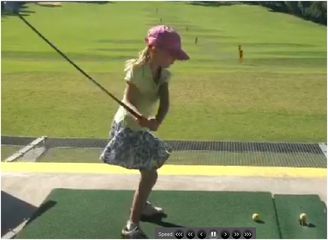 After many years of working with numerous golfers who have achieved success at the elite level I believe that mental toughness training has to be introduced and developed at an early age. I have seen many young golfers look like potential world beaters in their teenage years but sadly not go on with it. My observation has been that it was not their lack of technical expertise that held them back, but their lack of mental toughness that finally was their stumbling block. If you have any interest of seeing first hand the impact of mental toughness (or the lack of it) in sport, attend a major tour qualifying school such as The PGA, LPGA, European, Japanese or Asian tour school. Most of those that have better mental skills are the ones that we find succeed every time. And the others unfortunately are left trying to explain why they failed with "I tried too hard" or "not being able to let it happen out there" or "played too tentatively" So what are the key mental skills that a young junior golfer needs to learn and develop, that will hold them in good stead when they turn professional? They are listed below and are all important for juniors and their parents / coaches to understand and put into practice. Key No 1: You Are Not Your Golf Score This is such a critical thing for a young junior golfer to learn that his score for the day does not reflect what his personality is. Meaning the score he has does not make him a better or worse person. It is just a score, end of story. A young junior that gets loads of praise from parents/coaches when he does well, and then made to feel bad when he scores poorly is destined to hate the game and drop out at some point. A junior who can play without having to please someone else will play freely and not be afraid to make mistakes or try to protect their rankings. Key No 2: Learn To Breath For Peak Performance Breathing is the first thing we learn to do instinctively at birth. But learning to breath properly for peak performance needs to be learned as early as possible rather than later. The harmony and coordination required to ignite billions of cells, fire synapses that activate the muscles to fire in sequence is mind boggling. Yet the core of that coordination and sequencing is in breathing correctly. By teaching juniors how to develop awareness to focus, and also develop the potential of their breathing to control their mind and body when they are out of their comfort level especially in competition is vitally important. Good breathing techniques allow the lungs to provide more oxygen to the blood which slows the heart beat rate down and makes the brain more alert. All things needed for the golfer to make good decisions and maintain good rhythm and tempo throughout the eighteen holes. A simple breathing exercise for the junior to learn is divided into three parts. Before starting this exercise understand that a complete full breath is the critical foundation for doing it correctly. The best place to learn is when walking between shots. 1st part: Inhale for 2 steps 2nd part: Hold for 2 steps 3rd part: Exhale for 4 steps The other benefit is that doing this exercise also reduces the internal dialogue or self talk and helps the golfer stay in the moment. Which takes me to the next key. Key No 3: Don't Be A Time Traveler What I mean by this is that your body cannot go into the future or past but you certainly can with your mind! The quicker the junior accepts the past and is not afraid of something that hasn't happen yet (the future) the better chance he/she will keep their mind/body in the same place. This key skill needs to be learn't before they develop bad post shot routines that "anchor" negative emotions. The junior who does not learn this skill will be limited in their ability to perform well when it counts the most to them. Key No 4: You Cannot Control The Outcome You have probably heard this cliche many times before but every round that a golfer plays unexpected "Things" happen like a bad bounce, a missed short putt or a perfect drive finishes in a divot! So what should you do when these circumstances occur. PTGC co-director Lawrie Montague has the perfect answer. The only things you have complete control when you play this game is your preparation and reaction to each and every shot you execute and nothing else period! Accept the outcome and move on because you don't have any other choice. And if you think you do you will be signing for a higher score than you wish for. Teach the junior this and he/she will achieve their full potential  Key No 5: Play To Succeed This is an important point that many parents/coaches fail to instill in juniors. Instead of encouraging the junior to play to succeed the junior is guided to avert failure. This miss-guided thinking is to protect rankings and take the safe route and not take risk. These juniors are the ones that end up at tour school and will be quoting the "I tried too hard", or "not being able to let it happen" or "trying to hold on" as that is what they have practiced throughout their developing years. If you are working with a junior golfer, or have a child that loves the game, teach them the above 5 keys that will guarantee mental toughness. With these 5 keys they will ingrain the habits that will allow them reach the ultimate goals they strive for. David Milne and Lawrie Montague - Pro Tour Golf College Your Success On Tour is Our Business Comments are closed.
|
Archives
June 2019
|
Proudly Supported By
Copyright © 2011 - 2018 Pro Tour Golf College
Website Managed By Golf Performance Media
All Rights Reserved
Website Managed By Golf Performance Media
All Rights Reserved

 RSS Feed
RSS Feed



